Intro to diversity quiz
1/49
Earn XP
Description and Tags
ur mom
Name | Mastery | Learn | Test | Matching | Spaced |
|---|
No study sessions yet.
50 Terms
How many species are estimated to exist on Earth?
2 million
8 million
10 million
30 million
10 million
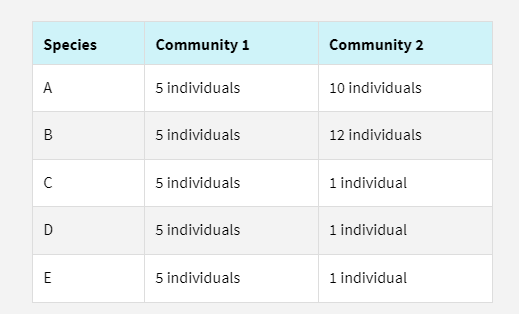
What is the species richness of these communities?
5 10 12 25
5
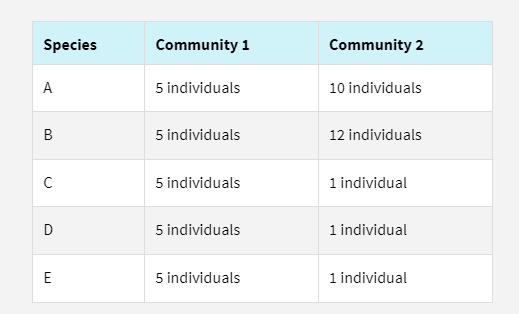
Which statement best describes the two communities?
Community 1 has the same species evenness as Community 2.
Community 2 has a higher species richness.
Community 1 has a higher species evenness.
Community 2 has a lower species richness.
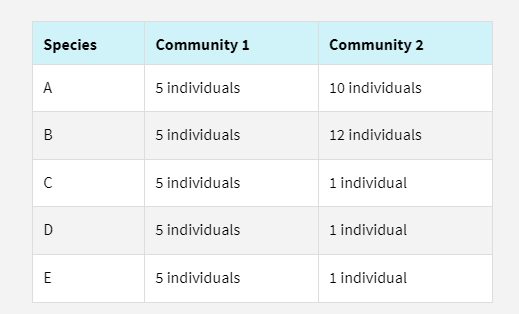
Which statement best explains the biodiversity of these communities?
Community 1 has the highest biodiversity because it has the highest species richness.
Community 1 has the same biodiversity as Community 2.
Community 2 has the highest biodiversity because it has the highest number of individuals.
Community 1 has the highest biodiversity because it has the highest species evenness.
Community 1 has the highest biodiversity because it has the highest species evenness.
Which statement best describes an environmental problem that can result from the loss of habitat diversity?
Generalist species will be lost more quickly than specialist species.
Specialist and generalist species are likely to be similarly impacted.
Specialist species will be lost more quickly than generalist species.
Neither specialist nor generalist species are likely to be impacted.
Specialist species will be lost more quickly than generalist species.
Which of the following best explains how ecosystems would be affected by an increase in species richness?
An increase in species richness would decrease the stability in an ecosystem because the chance of a species being lost during a disruption would increase.
An ecosystem with increased species richness would be less likely to recover from disruptions because with more species, there is a greater chance that many of them will be lost.
An increase in species richness would increase primary productivity in an ecosystem, because fewer species will be present to compete with one another.
An increase in species richness would be more likely to recover from disruptions, because more individuals would be present to reproduce.
An increase in species richness would be more likely to recover from disruptions, because more individuals would be present to reproduce.
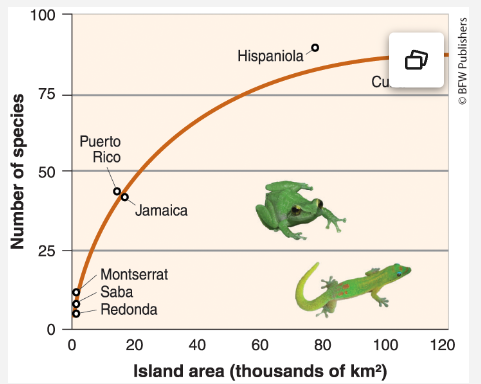
Which statement is the best description of the species-area curve?
It shows that species increase with island area.
It shows species richness peaks on islands of intermediate area.
The relationship is exponential when plotted on a log scale.
The slope of the logged relationship is commonly between 0.50 and 0.65.
It shows that species increase with island area.
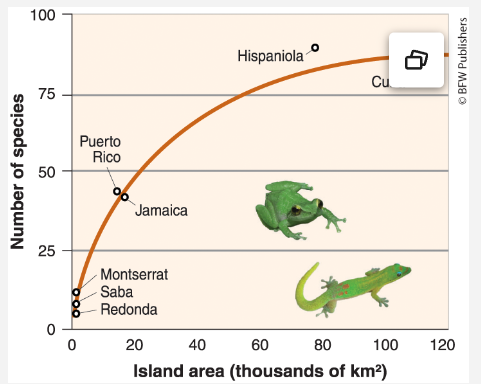
According to the graph, which island is the largest in area?
Cuba
Hispaniola
Jamaica
Montserrat
Cuba
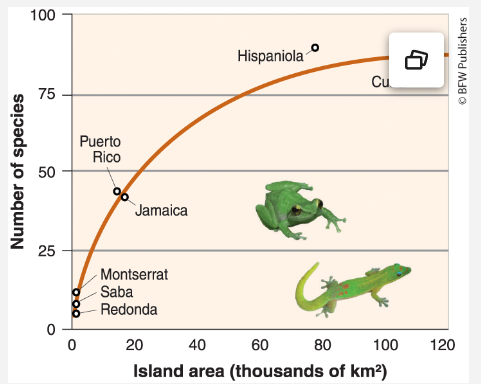
The best explanation of why large islands contain more species is that
larger islands are easier to migrate to because they are always closer to the mainland.
larger islands can only support specialist species, but they have high species richness.
larger islands have more available niches in a larger habitat, which can support more species.
larger islands are farther away from mainlands, which means only the fittest species can migrate there.
larger islands have more available niches in a larger habitat, which can support more species.
Why do more distant islands have fewer species?
Distant islands are generally smaller.
Distant islands have less habitat diversity.
Distant islands can only be colonized by species with the best dispersal abilities.
Distant islands have greater habitat diversity.
Distant islands can only be colonized by species with the best dispersal abilities.
Which statement is the best explanation of the model of island biogeography?
As an island increases in species richness, the extinction rate decreases.
As an island increases in species richness, the colonization rate increases.
As an island increases in species richness, the extinction rate increases.
As an island increases in species richness, the extinction rate and colonization rate both increase.
As an island increases in species richness, the extinction rate increases.
Why are many island species particularly vulnerable to invasive species?
Island species are often generalists with a varied diet of available food.
Island species are often specialists with highly evolved defenses against predators.
Island species are often generalists, but have no evolved defenses against predators.
Island species are often specialists with no evolved defenses against pathogens.
Island species are often specialists with no evolved defenses against pathogens.
The abiotic conditions under which a species can survive and reproduce is called its
species diversity. realized niche. geographic range. fundamental niche.
fundamental niche
Which best describes a factor that might prevent a species from shifting its geographic range in response to a changing climate?
a slow rate of environmental change
a highway built through a native species’ habitat
a new tract of forest planted to combat the effects of deforestation
a new law preserving thousands of acres of forest from logging
a highway built through a native species’ habitat
How would the introduction of a predator species affect the distribution of a species?
The species will immediately go extinct.
The species will change its location, as its fundamental niche has changed.
The species will change its location, as its realized niche has changed.
The species will remain in its current location and outcompete the predator species.
The species will change its location, as its realized niche has changed.
How many mass extinction events have there been in Earth’s history?
two
four
five
seven
five
Which is a significant cause of the current mass extinction event?
captive breeding programs
recreational fishing
laws protecting species’ habitat
s extreme weather events
extreme weather events
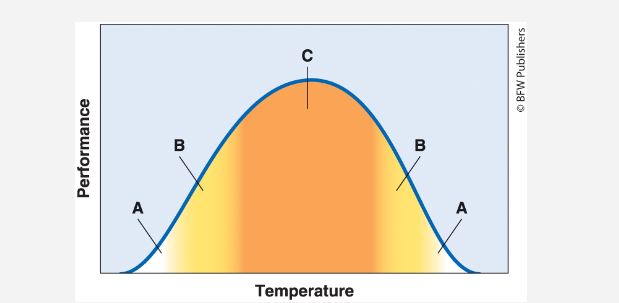
The areas on the graph marked “A” represent where a species is able to'
only survive.
survive and grow.
survive and reproduce.
survive, grow, and reproduce.
only survive
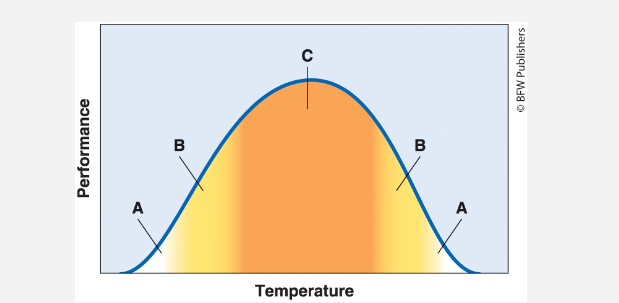
The area on the graph marked “C” represents an organism’s
range of tolerance. ‘
fundamental niche.
realized niche.
geographic range.
fundamental niche.
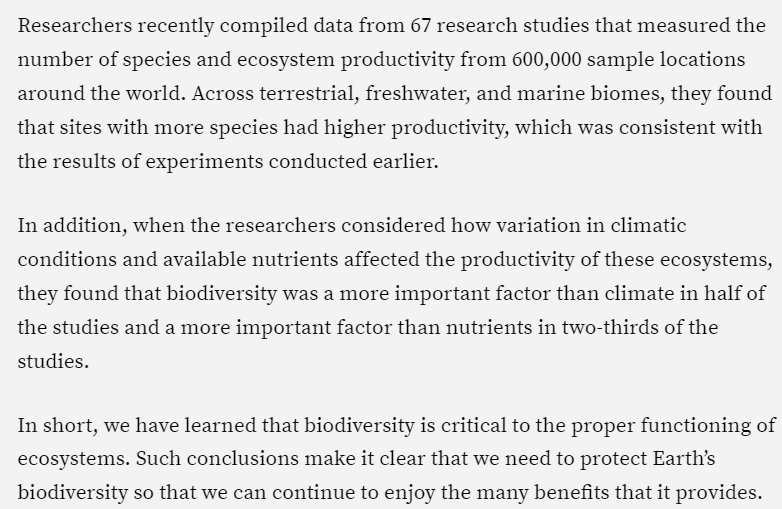
Which of the following best describes the author’s conclusion in the passage?
Climate is the most important factor affecting the productivity in an ecosystem.
More species leads to a decrease in productivity in ecosystems.
Species richness has a larger effect on productivity in ecosystems than nutrients or climate.
Ecosystem productivity directly increases biodiversity of ecosystems.
Species richness has a larger effect on productivity in ecosystems than nutrients or climate.
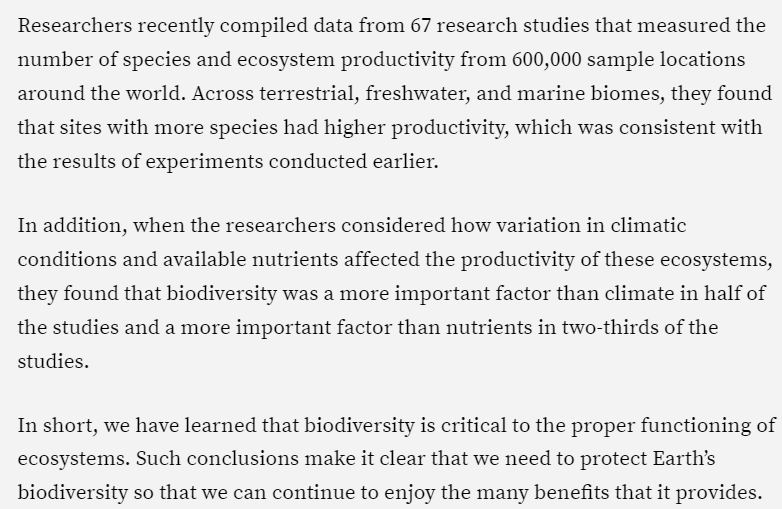
Which of the following is evidence that supports the author’s conclusion in the passage?
67 research studies were conducted.
Terrestrial, freshwater, and marine biomes were investigated.
Two-thirds of the studies found that biodiversity affected productivity more than nutrients.
Sampling was conducted in 600,000 locations around the world.
Two-thirds of the studies found that biodiversity affected productivity more than nutrients.
Which is the best description of natural disruptions?
They are only caused by humans.
They can occur periodically or randomly.
They always cause complete destruction of an ecosystem.
They are always detrimental to ecosystems.
They can occur periodically or randomly.
An ecosystem that rapidly returns to its original state after a disturbance is
resistant.
resilient.
stable.
adaptable.
resilient
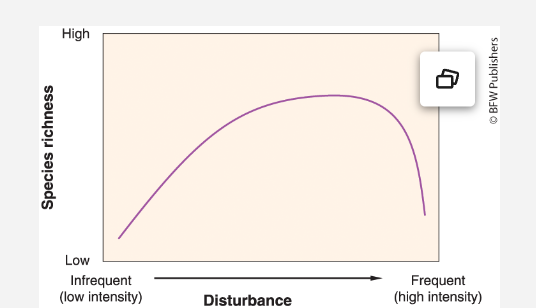
According to the graph, what effect will an intermediate level of disturbance have on an ecosystem?
An intermediate level of disturbance will increase runoff.
An intermediate level of disturbance will decrease primary productivity.
An intermediate level of disturbance will increase species diversity.
An intermediate level of disturbance will decrease biomass.
An intermediate level of disturbance will increase species diversity.
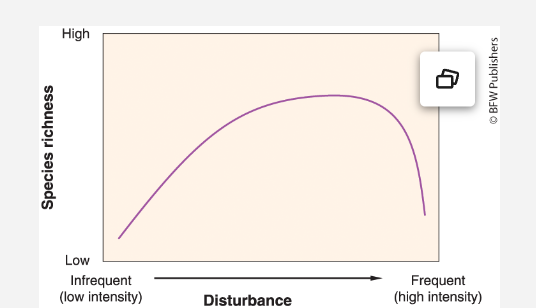
Which of the following best describes the relationship between species richness and disturbance?
As species richness increases, the level of disturbance increases to a maximum, and then decreases with more species richness.
As species richness increases, the level of disturbance decreases.
As the level of disturbance increases, species richness decreases.
As the level of disturbance increases, species richness increases to a maximum, and then decreases with further disturbance.
As the level of disturbance increases, species richness increases to a maximum, and then decreases with further disturbance.
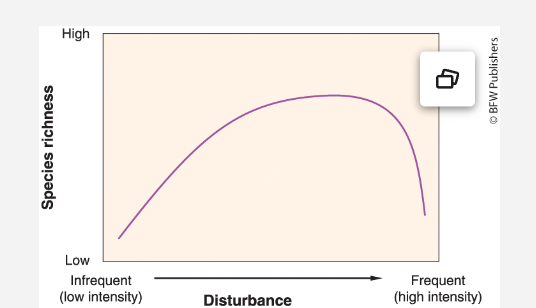
Which of the following best explains why an extreme level of disturbance will greatly affect species richness?
Disruptions with a large spatial coverage generally last longer.
Disruptions with a large spatial coverage generally last for shorter periods.
Disruptions that last longer generally have a small spatial coverage.
Disruptions that last longer generally have an intermediate spatial coverage.
Ecosystems where disturbances are rare will have decreased species richness, as they favor specialist species with a good ability to compete.
What is the relationship between a natural disruption’s duration and its spatial coverage?
Disruptions with a large spatial coverage generally last longer.
Which is a measure of how much a disturbance can affect the flows of energy and matter in an ecosystem?
diversity
intensity
resistance
resilience
resistance
A phenotype is best described by which of the following?
It is an adaptation that creates a new species.
It is the genes of a particular individual.
It is a result of genetic recombination.
It is the set of traits expressed in an individual.
It is the set of traits expressed in an individual.
Which is the best definition of an adaptation?
a mutation that creates a new species
a trait that improves an individual’s fitness
a trait that is passed on to the next generation
a trait created by natural selection
a trait that improves an individual’s fitness
The change in the genetic composition of a population over time due to random mating is called
the bottleneck effect.
gene flow.
genetic drift.
mutation.
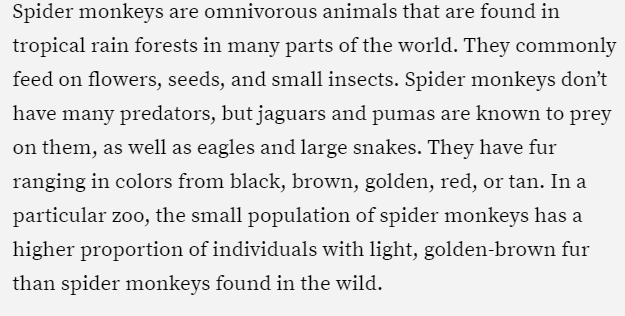
If the monkeys were recently captured from the wild and if fur color is largely determined by genetics, what evolutionary process is at work?
the founder effect
the bottleneck effect
artificial selection
genetic drift
the founder effect
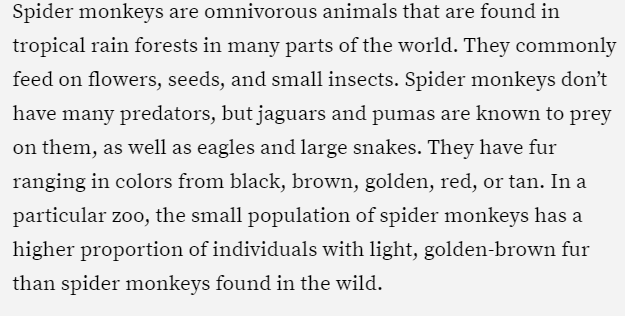
If the small zoo population of spider monkeys is later released onto an island where it can grow into a large population, which outcome is most likely?
The genetic diversity will be lower than the zoo population.
The genetic diversity will be lower than the original wild population.
The genetic diversity will be similar to the original wild population.
Genetic diversity will be higher than the original wild population.
The genetic diversity will be lower than the original wild population.
Which would cause the most-rapid evolution?
artificial selection
geographic isolation
recombination
natural selection
artificial selection
The Bt-cotton is an example of
evolution through geographic isolation.
evolution through genetic modification.
evolution through natural selection.
macroevolution.
evolution through genetic modification.
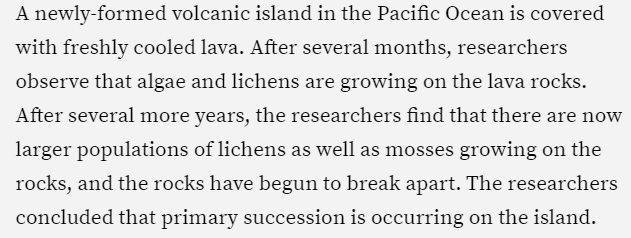
According to the passage, which species are the first to colonize the freshly cooled lava?
mosses & algae
trees & shrubs
lichens & algae
grasses & lichens
lichens & algae
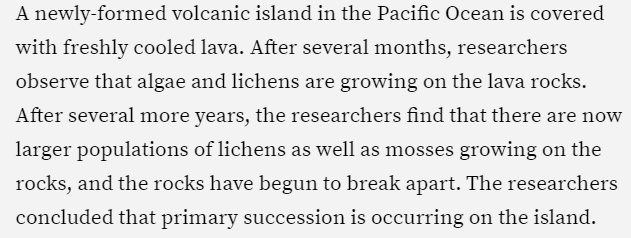
According to the passage, what can be concluded about the species richness of the volcanic island over time?
After several years, the species richness of the new island is the same as it was when it was formed.
After several months, the species richness of the new island is decreasing.
After several months, the species richness of the new island is at its maximum.
After several years, the species richness of the new island has increased to include species of lichens, mosses, and algae.
After several years, the species richness of the new island has increased to include species of lichens, mosses, and algae.
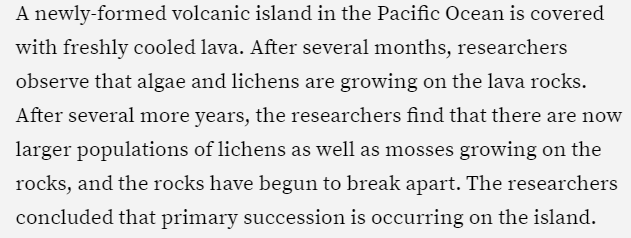
According to the passage, what evidence do the researchers have to reach their conclusion?
Primary succession starts with bare soil.
Primary succession causes the number of species to initially decrease.
Primary succession occurs after forest fires.
Primary succession begins with colonization by algae, lichens, and mosses.
Primary succession begins with colonization by algae, lichens, and mosses.
The process of succession in a shallow lake
results in a terrestrial ecosystem.
occurs rarely because disturbances are rare.
progresses fastest in very deep lakes.
has no climax species.
has no climax species.
Which tree species is an early-succession species in North American forests?
beech
fir
aspen
maple
aspen
Which of the following best describes an environmental problem associated with a sudden decrease in the population of a keystone species in an ecosystem?
A sudden decrease in the population of a keystone species is always caused by human activities.
The loss of a keystone species will cause a sharp increase in the primary production in an ecosystem.
A sudden decrease in the population of a keystone species will result in increased gene flow in a population.
The loss of a keystone species can have a cascading effect on the populations of other species in its food web.
The loss of a keystone species can have a cascading effect on the populations of other species in its food web.
Which describes an indicator species?
a species that has a large effect on other species in the community
a species that suggests the presence of human sewage
a species that serves as a pioneer species in succession
a species that serves as a climax species in succession
a species that serves as a climax species in succession
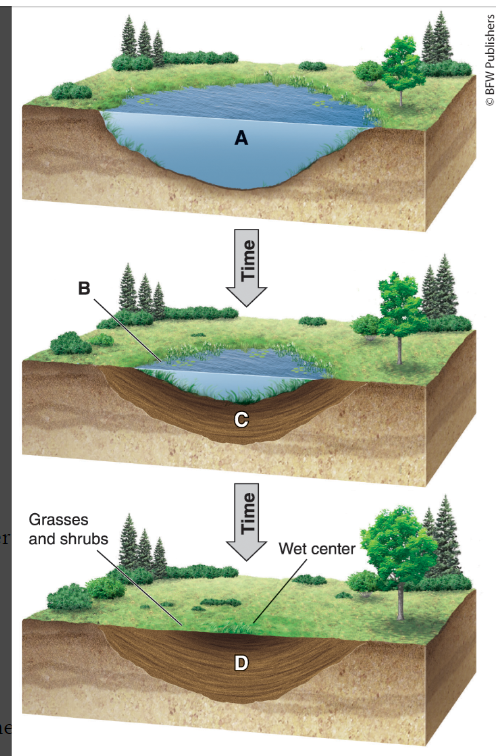
8. Which letter in the diagram represents the latest stage of aquatic succession?
d
Which of the following best explains the progression of events depicted in the diagram?
The process of succession in an aquatic ecosystem can occur over thousands of years as sediment slowly fills in a body of freshwater.
The process of primary succession occurs in a freshwater ecosystem after sediment has filled in a body of water.
Aquatic succession takes place over millions of years and gives rise to new aquatic species.
Aquatic succession takes place more quickly than terrestrial succession.
The process of succession in an aquatic ecosystem can occur over thousands of years as sediment slowly fills in a body of freshwater.
The intrinsic value of an ecosystem
is the total monetary worth of its features.
is based on the goods the ecosystem produces.
considers the potential benefits that could be discovered in the ecosystem.
is the value it has independent of any benefit to humans.
is the value it has independent of any benefit to humans.
A cultural ecosystem service of forests could best be described by which statement?
harvesting timber to produce homes for humans scenic
overlooks for hikers to enjoy
water and air purification by trees and soil
habitats for predators of agricultural pests
scenic overlooks for hikers to enjoy
Which is an example of a provision service?
Many important pharmaceuticals have their origin in nature.
Ecosystems provide habitats for native pollinator species.
A rainforest with high diversity can store more carbon than most crops.
High diversity can increase the aesthetic value of nature.
Many important pharmaceuticals have their origin in nature.

According to the passage, which statement is correct about food production as an ecosystem service?
The increase in food production is not keeping up with human population growth.
Increases in food production vary among different regions of the world.
Increased food production has allowed the use of less synthetic fertilizer.
Increased food production has been done without increased clearing of land.
Increased food production has been done without increased clearing of land.
According to the passage, which location would be at the highest risk if it experienced a long drought?
California, because its supporting services would be severely affected by drought.
The United States, because its regulating services would be severely affected by drought.
Central America, because its cultural services would be severely affected by drought.
Nicaragua, because its provisions would be severely affected by drought.
Nicaragua, because its provisions would be severely affected by drought.
Which of the following provides the best explanation regarding the importance of pollination as an ecosystem service?
Increased crop production has led to increased pollinator populations, which has decreased food production everywhere in the world.
Increased land clearing has led to less pollinator habitat, which has increased food production globally.
In some regions of the world, bee populations have been declining, which will decrease global food production.
Pesticides remove harmful insects and help improve pollination by bees, which will increase global food production.
In some regions of the world, bee populations have been declining, which will decrease global food production.